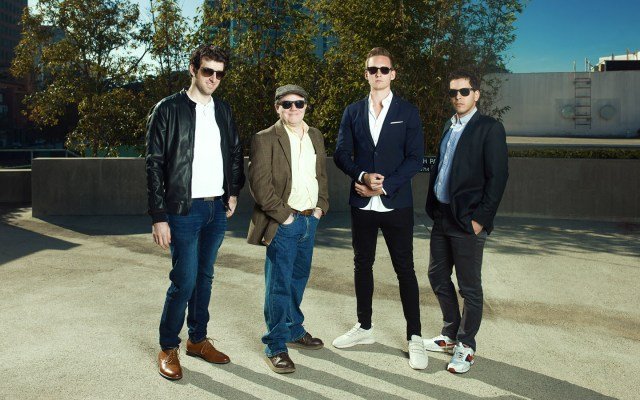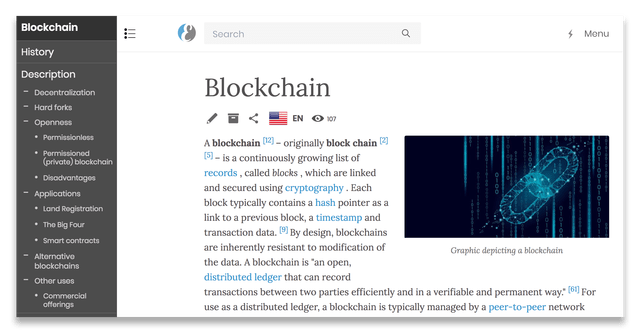
Being Rewarded for our Wikis
Information has great value. We know this from over two decades of social media dominance and the global use of massive repositories of online data. All of us feed an industry of info each and every time we post, share, search, like, and upload. Then, if we know that our info has great worth, why don’t we normies see a cent of that value? And how come even the most databases like Wikipedia struggle to keep afloat and contemporary?
What’s worse, the sheer mass of moment-to-moment content makes it almost impossible to verify the good from the bad, resulting in information databases keeping a stranglehold on who can upload and edit content. The result is just a tiny fraction of a global community contributing to a meaningful store of knowledge and ‘truth’.
Everipedia stands to change that model, currently situated as the largest English language encyclopedia and built on the decentralized blockchain of EOS. With its own native cryptocurrency, “IQ”, the application has already nurtured a community worldwide that creates and edits the most dynamic database today. We got to speak with members of the founding team - Theodor Forselius (CEO), Mahbod Moghadam (CCO), and Larry Sanger (CIO and co-founder of Wikipedia) - on how they’re putting their and others’ IQ to work on Everipedia.

The Creative Crypto CC: How did Everipedia get started?
Theodor - When we first started, it wasn't a blockchain encyclopedia, it was just a more modern version of what we have at the moment. We got into blockchain because my colleague Sam had crypto as an inside hobby throughout us working on Everipedia. Even during our days in college, I came to his dorm room at UCLA and he was actually mining crypto because he had flat rates of electricity. He actually paid off rent and tuition using the profits from mining. In 2017, when the blockchain space started to pick up momentum, he saw the opportunity to turn a centralized traditional encyclopedia into something where the community could collectively own and host all of the content - the first true peer-to-peer knowledge base, all on blockchain.
We started looking into moving the knowledge base to a blockchain. There were too many obstacles with Ethereum with scalability issues because of the way it's constructed. That was why we moved over to EOS because of scalability and transaction speeds and all these kinds of things that's needed to build at a large scale. My understanding is that Larimer’s design for EOS is really created with content in mind first and foremost.
 From the left: Travis Moore, Larry Sanger, Theodor Forselius, Mahbod Moghadam
From the left: Travis Moore, Larry Sanger, Theodor Forselius, Mahbod Moghadam
Mahbod - Since starting Everipedia and then integrating blockchain, our focus has also shifted from building Everipedia, which is now fully functional with a growing community, to building out the IQ network and developing new dapps with the token. Everipedia will be one such application, and a following product will be like a crypto Quora where people can earn IQ for answering questions. We want to integrate more people into the Quora-type model like celebrities and be able to encompass all types of question and answer structures.
We called it the IQ token because the more you contribute, the more IQ you have and the ‘smarter’ you are. We’re treating the internet like one collective brain and Everipedia’s purpose is to maximize knowledge in a decentralized way.

CC: How does the IQ token and Everipedia work?
Mahbod - To contribute or edit anything on the Everipedia application, users have to stake a certain amount of IQ tokens which will renew for each voting period. Other users vet and vote on those contributions with their stake and the more they have, the larger the token rewards. Rewards come from inflationary pools that is then distributed based on voting governance. The staking is a type of financial investment to prevent spam or bad practices. However, if a contributor or team comes to us with a legitimate record, we provide IQ token to stake and get them started.
The big picture is to have many applications like Everipedia working with the IQ token so that personal stake, reputation, and many other functionalities will span multiple global networks.
CC: Blockchain enthusiasts often call for disruption or destruction of the targeted industries of dapps, but in your case, you have the co-founder of Wikipedia on your team creating what people are calling the “Wikipedia killer.” Larry, what do you see as the big contemporary hurdles and how are you trying to deal with them?
Larry - There was a problem that I saw with Wikipedia and I always viewed it as a missed opportunity. Yes, it's extremely useful, but I look at it as a founder. I was there when key decisions were made and I know that things could have gone differently. For example, we could have had a rating system. We never added a rating system that involved outside graders and many other things like that.
So I knew there are all kinds of things that could've been done. I actually tried to start a competing wiki encyclopedia called Citizendium, which never really took off. It got off to a great start, but it just didn't thrive. And so since around 2014/15, I’ve been thinking about basically how all the world's intellectuals could build something better than Wikipedia. There are so many millions of really smart people who aren't working on Wikipedia and there should be a way to organize them. And it occurred to me at one point that there isn't any single community that could appeal to that huge variety of people with so many different social, political, and cultural differences. Even with just the variety in writing styles, you couldn't build a single community that would appeal to all of them.

Therefore, what is absolutely necessary is that there be a decentralized network. My initial idea was what we need to do is simply collect all the encyclopedia articles that are already out there and make them available via a database and invite everybody in the world to rate them. And then when there's a single central repository of links and ratings, then that will encourage more people to add more articles and encourage competition.
With joining the Everipedia team, it's very easy for me to get excited because having articles from multiple sources all living side by side as part of a single protocol is going to create a new kind of knowledge economy. It's actually going to create these new interesting market forces that will surface the best of our knowledge on every topic, which will basically make it the Wikipedia killer.
Theodor - If I could just add on to the disrupting Wikipedia aspect, Sam and I were and still are huge fans of Wikipedia and it is actually our main inspiration. But if you think about the internet today and about the top ten largest apps and websites, we’ve seen continuous competition throughout the last two decades that have driven innovation forward constantly. This has happened for all parts of the internet except for online encyclopedias, of which only Wikipedia has stood out. And to add on to that, Wikipedia hasn't really been updated in terms of design or functionality or community policies since it was started almost 20 years ago. So that's why Sam and I decided to get started on this project because we just saw so much opportunity to improve on such an outdated model even though we're obviously big fans of the platform. There are just so many things we can improve upon.
CC: Why do you think that there hasn't been a competitor to Wikipedia before? Other subsets of the internet like social media have continuously developed new markets. Has the wiki space not been economically viable until blockchain?
Theodor - A few have tried and I'm not sure why they have failed, but I think one reason is that some of the big tech companies are obviously huge donors to these types of databases. The largest donor to Wikipedia I believe is Google, which explains why Google hasn’t made their own version of the encyclopedia.
Mahbod - Blockchain is definitely a huge enabler. The greatest minds in the space are trying to figure out how we monetize and “blockchain-ify” the internet. All this information is around and being used by various huge companies, but there hasn’t been a way for daily users to directly feed into that economy and feel like they are true participants. Blockchain helps us create a bigger underlying market that can include more diverse knowledge production.
Larry - Well, having started at a few different encyclopedias, I can tell you that it isn't easy at all. It takes a very unique sort of a skillset and just the sheer difficulty is part of it. That creates a high bar for anybody to get involved and actually compete. I'm actually the guy who started Wikipedia, and I tried to beat Wikipedia. It was hard to beat the 800-pound gorilla with Citizendium despite people’s excitement for a competitor. One of the interesting phenomena of open-source projects is that because people it's volunteer-driven, they tend to hurt all in one direction. There is a qualitative difference between just another online community and a decentralized protocol which is a network that enables players from lots of different communities to work together on what is ultimately a single product.
There are so many millions of really smart people who aren't working on Wikipedia and there should be a way to organize them... Therefore, what is absolutely necessary is that there be a decentralized network.
- Larry Sanger

CC: What do you think that the free market aspect of Everipedia will do to the nature of knowledge creation, submissions, and contributions?
Larry - I think one really interesting aspect is the quality of the information that's submitted on traditional information sites. Users submit the information and then if the information is bad, admins and traditional tools are used to moderate it.
What we're doing with the staking model is, without getting too deep in the technicals, that in order to create the article or submit an edit, you have to stake tokens and then if other editors in the network approve your edit, you get back your collateral plus rewards. But if your edit is revoked and dismissed by the rest of the community, then your collateral is essentially burnt up, making it financially infeasible to post malicious content or spam and do any form of trolling, unless you want to spend a bunch of money on doing that. So this is an interesting way to use financial incentives with blockchain technology to ensure a constant quality.
CC: What other use cases are you excited about or are thinking about implementing? What are upcoming new spaces for the IQ token?
Mahbod - The first step is knowledge projects. A new Wikipedia made the most sense since we’re compounding knowledge for the long-term. We’ll be building more knowledge creation and storage dapps like one similar to Quora and more soon. We’ll be releasing a press release in a couple of weeks around another project on prediction markets, gathering collective information for all kinds of future outlooks.
Social media is the next frontier, creating and incentivizing a different kind of knowledge creation and rewarding users. We learned a lot from the STEEM protocol and Steemit website, like staking to prevent spam for example, and we want to create a new Facebook model with the IQ token. Facebook is starting to implement crypto like with WhatsApp, but I’m a firm believer in creative destruction. When you have a hugely disruptive force like crypto, it’s impossible for the incumbent to adapt that quickly and take control.
 The Creative Crypto on Everipedia!
The Creative Crypto on Everipedia!
CC: How do you think a person not yet familiar with blockchain is going to start engaging with Everipedia in a way that's different than what they are used to with Wikipedia?
Theodor - The rewards aspect is very interesting for people, especially students and people in developing countries. There’s a fairly large user base in India for example, where they have a lot of volunteers that are creating all this content for free that's being managed by the Wikimedia Foundation. It's all stored on their servers. I think the whole idea around contributing content to a peer-to-peer network that you're a stakeholder in is very interesting for people being able to actually earn back the value that you create through the tokens and actually earn real financial rewards.
So back to the competence aspect, a lot of people ask how is Everipedia going to be able to compete with Wikipedia that already has 5 million articles in English. We just just followed their model, because when Wikipedia started out, they actually imported all of the Encyclopedia Britannica as the foundation - 200,000 articles or something like that. We literally followed their example. Our own community so far has created above a million articles on top of that amount from Wikipedia. In terms of content, we’re the world's largest english encyclopedia.
We're trying to create the most complete knowledge base in the world. All articles from Wikipedia plus more from other encyclopedias and from our own community and so forth. We've also done really well in terms of covering stuff that Wikipedia doesn't cover. For example, youtubers, bloggers, social media influencers, rappers, and other pieces of content that tend to not be considered notable according to the previous academic perspective.
Larry - A big short-term goal is redesigning the front end, making it a lot easier to use. It’ll make Everipedia potentially more attractive than Wikipedia for the end user and the answer is it's going to be a lot easier to contribute. For example, you click a button and new content is automatically submitted to Everipedia. That sort of thing could make it a lot easier and then people actually would be able to participate in what has the potential to become the largest encyclopedia project in the world - one that is much bigger than Wikipedia because a relatively small number of people contribute there, just on the order of 10,000 regular contributors, whereas there are millions of people who could be interested in working on some encyclopedia and we're actually creating the infrastructure for that.
...we want to create a new Facebook model with the IQ token. Facebook is starting to implement crypto like with WhatsApp, but I’m a firm believer in creative destruction. When you have a hugely disruptive force like crypto, it’s impossible for the incumbent to adapt that quickly and take control.
- Mahbod Moghadam
Thank you Larry, Theo, and Mahbod! To learn more about and start utilizing Everipedia and IQ, check out the platform and social links below -
Website: https://everipedia.org/
Twitter: https://twitter.com/everipedia
Facebook: https://www.facebook.com/everipedia
Reddit: https://www.reddit.com/r/Everipedia/
Telegram: https://t.me/everipedia
Posted from my blog with SteemPress : https://thecreativecrypto.com/our-information-our-new-economy-interview-with-the-everipedia-team/
This project is being supported by @Fundition the next-generation, decentralized, peer-to-peer crowdfunding and collaboration platform, built on the Steem blockchain.
Read the full details of Fundition Fund program
Learn more about Fundition by reading our purplepaper
Join a community with heart based giving at its core
Fundition is a non profit project, by supporting it with delegation you are supporting 200+ projects.
50SP100SP200SP500SP1000SP2000SP5000SP10000SP
Downvoting a post can decrease pending rewards and make it less visible. Common reasons:
Submit